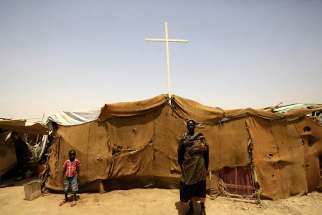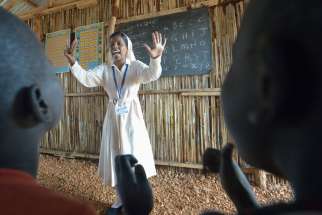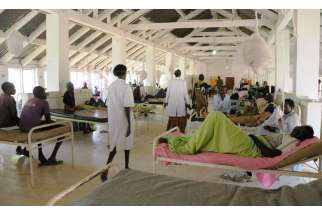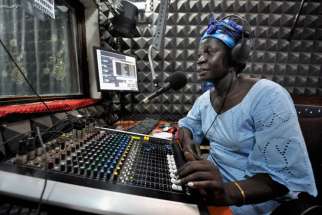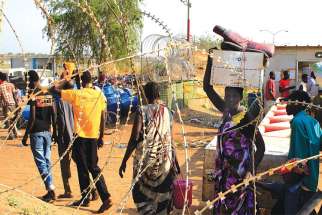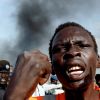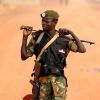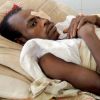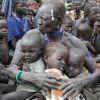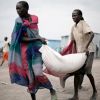One year after Meriam Ibrahim's release, two Christians face possible death penalty in Sudan
Last year, a death penalty sentence slapped on a Sudanese doctor for refusing to renounce her Christian faith stirred international outrage and heightened calls on the government to increase religious liberty.
South Sudan church leaders push alternative peace process
JUBA, South Sudan - Church leaders in South Sudan are trying to breathe new life into their country's stalled peace talks.
As world attention shifts to the growing influence of Muslim militant groups on the African continent, few have paid any attention to the ongoing bloody conflict in South Sudan.
Catholic radio forced off air
A Catholic Radio station in South Sudan that the Canadian bishops’ development agency hopes to support has been shut down for reporting both sides of a story.
Help restore dignity to South Sudan
JUBA, South Sudan - When South Sudan's fledgling democracy suddenly unraveled in December, what started as political infighting within the country's ruling party quickly ripped along ethnic fault lines, often pitting neighbours against each other according to the tribal markings on their faces.
Congolese refugees fear going home but feel unwelcome in South Sudan
YAMBIO, South Sudan (CNS) -- As the military hunt for Joseph Kony continues throughout this region, refugees who fled across the border from Congo to escape his Lord's Resistance Army say their welcome in South Sudan is wearing thin.
"I want to go home, but I'm afraid of Kony. As soon as the LRA is gone, I'll go back. It's my country," said Bernadet Adesa, 35, who lives in the Makpandu refugee camp near the border.
"This has been a good place for us, but every day there are more and more problems between us and the South Sudanese. If anything bad happens here, we Congolese get blamed for it," she said.
A Catholic priest who lives in the camp said the refugees are caught between being harassed inside South Sudan or returning to the Congo where the LRA, although weakened, still rampages through the forest, robbing, abducting and killing.
"The Congolese no longer feel welcome here. They live on land that's not theirs, and their freedom to work and make money has been curtailed," Italian Comboni Father Mario Benedetti told Catholic News Service.
After 38 years as a missionary in Congo, Father Benedetti accompanied the refugees to South Sudan in 2008. Today his parish is the refugee camp -- a ramshackle collection of mud huts 25 miles from Yambio.
Father Benedetti suggests tough economic times are at the root of the tension. South Sudan has been in a crisis since January, when the government in Juba cut off the oil it pumps through pipelines that run through neighboring Sudan. A Sept. 27 agreement between the two governments will restart the oil flow, but it will take months for the situation to improve.
"The Congolese are harder workers than the South Sudanese. They're better businesspeople. They can make enough money to buy a motorcycle, and the South Sudanese can't, so they get jealous of the refugees," the priest said.
Authorities have closed a market the refugees opened in the middle of their camp, forcing them to cross the road to buy basic supplies in a Sudanese market. Father Benedetti said the police had prohibited the Congolese from selling bags of charcoal along the road.
"The South Sudanese who live nearby weren't happy because of the competition. So now the refugees can only sell charcoal from their huts, but who's going to stop their car on the road and walk into the camp?" he asked.
Father Benedetti said a local radio station in Yambio is constantly insulting the Congolese and blaming them for every problem, a role he compared to Radio Mille Collines in Rwanda during that country's genocide.
"They're trying to discourage and frighten us, so we'll go back home. But it's not safe there yet. And here the Congolese have health care and schools, services they'd have to pay for back in the Congo," he said.
The bishop of the border area, who was a refugee in Congo and the Central African Republic, said he has spoken with local political officials about the harassment.
"Some of the local political leaders at times fail to respect the rights of the refugees, who are supposed to be protected and not harassed," Bishop Edward Hiiboro Kussala of Tombura-Yambio told Catholic News Service. "The host nation has the obligation to care for these people. But there's little knowledge of this, despite the fact that many of us were once refugees in their country."
The bishop said some refugees have felt forced by the harassment to return to Congo, which was not a safe option.
Security in the immediate area of the border has improved in the last year, in part because of the arrival of U.S. troops dispatched to help area armies combat the LRA. Yet Father Benedetti said he is disappointed in the results.
The U.S. soldiers "say they're here to observe and train other soldiers. But so far we don't know what they're doing," he said. "Yet just as they found Bin Laden, why can't they find Kony? It's an international shame."
Italian Comboni Sister Giovanna Calabria works in the nearby town of Nzara, where some of the U.S. troops are based as part of a joint operation with a special contingent of Ugandan troops.
"People here were happy when they (Americans) came. But no one is sure what they're doing now. I have the impression that their wings are cut. I don't hear that from them, as they keep their mouths closed. But I hear it from others," she said.
Bishop Kussala said that while stepped-up military patrols have recently kept Kony's forces at bay, the area is not truly at peace.
"As long as he's still in the forest, it's a negative peace. There may not be shooting, but the enemy hasn't been arrested and removed," he said.
Bishop Kussala said the church faces a variety of challenges in helping people move back home to rural settlements they abandoned when the LRA roamed the area. He also expressed concern for what might happen with community-based militias, widely known as the "Arrow Boys," which formed to defend isolated communities from LRA violence.
"If the LRA isn't there anymore, they'll find someone to replace the LRA, because they're accustomed to having weapons and moving around. So we're starting a rehabilitation program for these young men, but we need support," he said.
The bishop said that while he supported the military campaign to capture Kony, he was also pushing a diplomatic approach.
"They've employed a military approach to Kony here since 2007, and they still haven't captured him. So we just sent three priests to the Congo to talk about organizing a regional conference to see how the church could deal with this," Bishop Kussala said.
Sister Calabria said she doubts that diplomacy, religious or otherwise, will work.
"There is only one way to stop Kony," she said. "I don't want to kill him. If he is killed, it's his fault because he doesn't surrender.
She said Kony was "not a normal person, and he's forced many other people to not be normal anymore.
"Probably I'm not a good Christian, but it's time to stop him," she added.
NAIROBI, Kenya - One year after achieving independence, South Sudan remains plagued with corruption and ethnic discontent, prompting Catholic and Episcopal bishops to challenge the fledgling country's political leaders to "a change of heart leading to a change of behavior."
In a message marking the July 9 anniversary, Archbishop Paulino Lukudu Loro of Juba, South Sudan's capital, and Episcopal Archbishop Daniel Deng Bul, primate of the Episcopal Church in Sudan, expressed concern about reports of money being stolen by the country's high-ranking officials.
CAPE TOWN, South Africa - Catholic and Anglican bishops in South Sudan have urged all parties to immediately implement the resolutions of a peace accord signed in early May.
"The people and government of South Sudan desperately want peace," said 14 bishops representing the Catholic and Episcopal churches of South Sudan following a May 9-11 meeting in Yei, South Sudan. They said the resolutions in the accord, signed by leaders of the six communities of Jonglei state, deal "comprehensively with many of the key issues," set deadlines and promise sanctions if they are not met.
VATICAN CITY - Late April aerial bombardments, ground-force skirmishes and especially the increasingly hostile rhetoric of the leaders of Sudan and South Sudan had religious leaders worried about the possibility of all-out war.
The key problems are conflicting claims over oil revenues and the lack of a firm, internationally recognized border between Sudan and South Sudan, which became independent last July.
"The international community must help us to demarcate the border," Archbishop Paulino Lukudu Loro of Juba, South Sudan's capital, told the Vatican's Fides news agency April 24.
Three workers for Catholic aid agency arrested in Darfur
JUBA, South Sudan - Three staff members of a Catholic aid agency working in southern Darfur were arrested by security forces in Nyala as they were making preparations to return to South Sudan.
The Sudan Catholic Radio Network reported security forces also closed the Nyala office of Sudan Aid, an affiliate of Caritas Internationalis, the Catholic church's aid and development organization.
WASHINGTON - Saying civilian lives are at risk, Catholic leaders appealed to the international community to step up efforts to prevent full-scale war from erupting over disputed territory along the tenuous Sudan-South Sudan border.
Auxiliary Bishop Daniel Adwok Kur of Khartoum, Sudan, said in an email to Catholic News Service that tensions between Sudan and South Sudan, the world's newest nation, could be defused if the United Nations and the African Union would mediate the differences and attempt to determine the proper border between the two countries.
CAPE TOWN, South Africa - The church in South Sudan and its partners in North America are frustrated that their efforts to build peace in the infant country are threatened, but they have not given up, Catholic officials said.
A serious political deadlock between South Sudan and its northern neighbor, Sudan, over the split of oil revenues "could lead to a declaration of war," said Auxiliary Bishop Santo Loku Pio Doggale of Juba, capital of South Sudan.
Bishop Doggale said that he and other church leaders met with South Sudan President Salva Kiir and other senior government officials in Juba after the government announced Jan. 20 that it was shutting down oil production immediately.
JUBA, South Sudan - The Sudan Council of Churches has committed to involving young people from war-torn Jonglei state in a grass-roots peace process.
The council said the state's young people have no political leadership. A series of retaliatory attacks between ethnic groups in Jonglei has displaced tens of thousands of people since late December.


